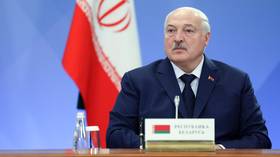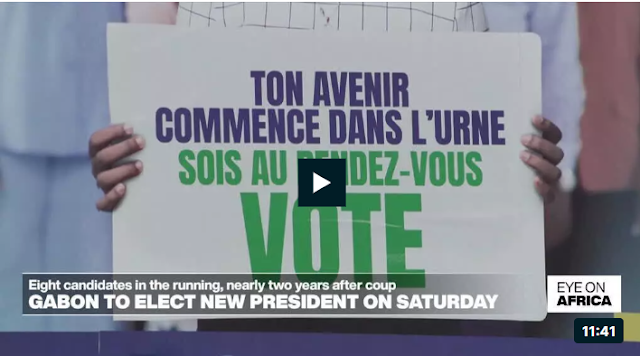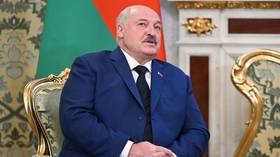Gabon votes in first presidential election since coup ended
55-year Bongo dynasty
Gabon voted on Saturday for its first elected leader since a 2023 coup overthrew the Bongo dynasty, which had ruled Gabon for more than 55 years. The Bongo family has been accused of looting the wealth of a nation where a third of its 2.3 million people live in poverty despite the nation's vast oil resources.
Issued on: Modified:
Voters in Gabon headed to polling stations on Saturday in the first presidential election since a 2023 military coup ended a political dynasty that lasted for more than 50 years.
Some 920,000 voters, including over 28,000 overseas, were registered to participate across more than 3,000 polling stations. After voting ended at 6:00 pm (1700 GMT), the interior ministry said turnout had run to 87.12 percent.
It is a crucial election for the country’s 2.3 million people, a third of whom live in poverty despite its vast oil wealth.
The interim president, General Brice Clotaire Oligui Nguema, toppled President Ali Bongo Ondimba two years ago. He hopes to consolidate his grip on power for a new seven-year term in office, renewable once.
Nineteen months after overthrowing president Bongo, whose family ruled Gabon for more 55 years, Nguema has pitched himself as a change agent cracking down on the corrupt old guard.
Nguema, 50, has criss-crossed Gabon in a baseball cap with the slogan, "We Build Together" during the campaign.
He has been leading in opinion polls.
Polling stations opened at 7am (0600 GMT) and closed at 6pm (1700 GMT), with the result due on Sunday.
His main challenger is Alain Claude Bilie By Nze, who was serving as prime minister under Bongo before the August 2023 coup, the eighth in West and Central Africa since 2020.
A new constitution approved in November cleared the way for Nguema's candidacy.
Analysts say his status as the frontrunner comes from a sense that people were broadly happy with the coup and him being the most visible candidate during the campaign.
Nze's close ties to the old government – which was accused by critics of vote-rigging – also undermine his warning that Nguema poses a threat to Gabonese democracy, said Florence Bernault, a historian of Central Africa at Sciences Po.
"He doesn't seem to be very well placed to criticise," Bernault said.
Power cuts
Gabon's economy grew by 2.9% in 2024, up from 2.4% in 2023, driven in part by infrastructure projects and increased production of commodities such as oil, manganese and timber, according to the World Bank.
But many voters told Reuters they were mostly concerned about basic services, citing power cuts that plague the capital.
"We talk about it every day. So this is a primary urgency because we don't want to have this anymore, these daily power cuts," said 40-year-old electrician Herve Regis Ossouami.
"I don't know a Gabonese person who would say they don't want water and electricity."
Lukashenko tells Belarus officials to
self-fund ‘mistresses’

Belarusian President Alexander Lukashenko has called for the exclusion of personal expenses from state funds earmarked for promoting sports. Instead, he has urged top government officials to fund their “mistresses” with their own money.
Speaking on Friday at a meeting focused on support for physical culture and sports organizations, the Belarusian leader told officials to report on various issues, including oversight of state funds allocated to national sports clubs and federations.
“I want to warn you, guys, it’s not hard these days to track how this money is being spent – and we will track it,” Lukashenko cautioned.
“But I want to say, man to man, that you should support your family, loved ones, mistresses, or anyone else with your own money. That will be the right thing to do – both humanely and manfully,” the president added, noting that officials can earn money wherever they want.
Lukashenko expressed hope that his comments would prompt officials to draw the right conclusions.
“The real question is: how fairly – and more importantly, how responsibly – are clubs managing these funds? Or are they just blindly using them? What exactly are the finances being spent on?” he asked.
Combating corruption was one a key theme of Lukashenko’s presidential campaign ahead of an election held in January. In early February, the Central Election Commission declared the 70-year-old politician the winner with 86.82% of the vote. None of the other candidates received more than 5%.
In December, upon appointing Ruslan Chernetsky as Minister of Culture, the Belarusian leader expressed dissatisfaction with the state of the country’s film industry.
“I just want to say man-to-man, Ruslan – you have no other choice: either die, or bring order to the sector,” Lukashenko said at the time.






No comments:
Post a Comment